Will We Break Through? Military Evasion and Results of Sociological Research
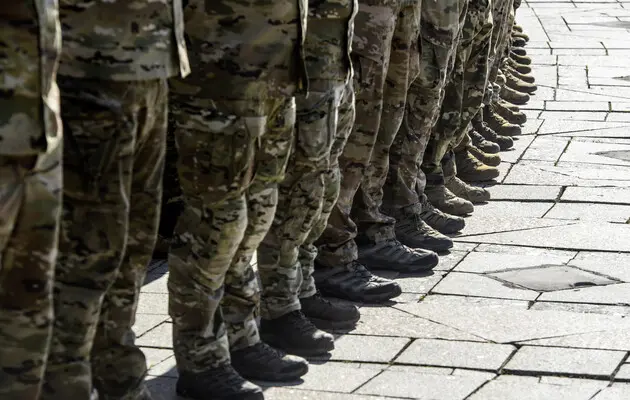
— Lokha, we are going to the Shevchenkiv Military Commissariat. Come, it's half an hour's walk from you. Don't forget the documents, I shouted into the receiver early in the morning on February 25.
Lokha has always been my best and most reliable friend. He never asked "why" when I said I had to go somewhere and do something.
Need to take the wounded from Maidan? — Yes, let's go.
Need to fend off paid groups of mercenary provocateurs near the Chervonyi Khutir? — Let's go.
Need to unload a truck? — Tell me when.
Need to move a family of immigrants? — Ok, I'll take the day off.
Therefore, I had no doubt that we were going to fight together.
"Are you out of your mind?" You should at least take a shoulder bag, I said to my friend, who was storming the gates of the Military Commissariat in the crowd. The crowd was determined and scared at the same time. Future brothers and sisters who have never held a weapon in their hands.
— I'm not going with you. I'll just take you on your way.
— Why don't you go? Are you serious now?!!!
— Seriously. Someone has to stay. I have to shoot, write, talk about the war. When the summons comes, then I will go, I will not hide. And now I'll just take you on your way.
...In a year, he received his summons to the army, passed the Military Medical Commission of Ukraine and after the Military Training Center went to the east of Ukraine. Together with other newcomers. At that moment, a large part of those with whom I was standing in the courtyard of the Military Commissariat had already died or were wounded. And it was probably more difficult for him to go than for us. We had a "last battle" feeling. He already saw what we didn't know then, namely that the war will continue for many more terrible years, demobilization is not foreseen, you get a one-way ticket. I know that he could make a little effort and find an opportunity not to go to serve in the army. But he didn't do it. It was simply his turn to serve in the army. And he thought it was fair.
...Peering into the sociological survey on mobilization, which was conducted by the sociological service of the Razumkov Center on behalf of ZN.UA from June 20 to 28, 2024, I was afraid to see the results. Because people like Lyosha, in my opinion, are rather an exception to the rule. All around are conversations about draft dodgers, the Tisza River, border crossing fees, and peace negotiations. Even in my bubble, which is almost entirely military or volunteer, there are those who do their best to avoid mobilization.
However, the numbers were not as terrible as I expected. For example, to the question "Are there among your friends, colleagues and acquaintances conscripts who are looking for an opportunity to avoid mobilization?"
the answer "among my acquaintances who are conscripted, all or almost all are looking for an opportunity to avoid mobilization" was given by only 8.8% of respondents. But the answer "there are none or almost none" was given by 17.5% of citizens. That is, almost twice as much. The rest of the respondents in their environment have both these and those answer options in different proportions: "such people make up the majority" — in 14.7%; "about half of them" — 11.6%; "such people are a minority" — in 13.8%; "there are such people, but I cannot determine what part of my acquaintances they are" — 17.7%.
"Are there among your relatives those who serve in the Defense Forces of Ukraine as volunteers or mobilized?" asked ZN.UA.
And it turned out that only a third of the respondents had neither volunteers nor mobilized members of their relatives (34.3%). This is very similar to the real-world figures. By the way, there are more mobilized citizens than those who left voluntarily — 44.7 and 33.1%, respectively. In fact, it is very difficult to calculate such a ratio. Because, for example, volunteers wrote statements to the Territorial Defense Forces of Ukraine with a request to enroll them in the Operational Reserve of the First Phase, on the basis of which they were immediately put through the mobilization procedure. Therefore, among those mobilized, there are many who came by themselves, without waiting for a summons.
By the way, despite the fact that the flow of volunteers cannot be compared to that which was in the first weeks of a full-scale invasion, it did not stop.
..."Today is one year since I came to the Military Training Center," my friend writes to me. She used the time the first wave of volunteers gave her to prepare. No, she had no military or medical education. She also had no military relatives. It was a well-considered decision and a long road of preparation. Now she sends me pictures of ruined positions and feels right where she is right now.
My friend's son is also getting ready. He still has four years left before mobilization, but he plans to go next year. When he completes all the planned training courses and closes his affairs with the institute. It must be said that at home it caused quite a storm of emotions. But gradually everyone came to terms with his decision.
By the way, about emotions. The majority of the respondents (55.5%), answering the question "Do you feel concern for yourself or your relatives in connection with the intensification of mobilization that is happening now?" chose the answer "yes, very strong concern". 22.4% of respondents feel "yes, but not very worried". And only 17% answered that it does not bother them at all.
Fear is one of the strongest emotions. And strangely enough, it is the driving force of many processes. Fear for relatives or for oneself can be converted into active actions, in particular, joining the ranks of the army. However, fear can paralyze or inhibit decision-making. That is why in the first place in the answer to the question "In your opinion, what is the most common reason for reluctance to serve in the Defense Forces of Ukraine of conscripts who avoid mobilization?" stands for "the inability to overcome the fear of death, the fear of being seriously injured." This is how 61.6% of respondents within the scope of the study answered.
There is probably not a single person at the front who is not afraid. Because the instinct of self-preservation is one of the basic ones. But fear at the front and fear in the rear are completely different fears. At the front, you can control the situation. No, of course, not in the global sense. But locally, yes. It largely depends on you whether you will stay alive. It depends on your dexterity, on your ability to provide first aid to yourself and your friend, on your reaction to changing circumstances, on your skills and preparation.
When I first came home for a short vacation, I didn't sleep well for a single night. Because my life and the life of my family depended exclusively on the Air Defense Forces. Just during this period, shelling of the city was almost daily. And one's own helplessness was incomparably stronger than the fear of getting injured in military positions.
The second in the rating of fears is "the risk of being sent to a combat zone without proper military training and equipment" (53%). And this, on the one hand, is understandable, and on the other hand, it is exactly what you can provide for yourself. Various courses and training grounds are enough these days. No training center is able to turn a novice into a fighting Rex in a short period of time. But you can not wait for mobilization to happen to you, and prepare for it today. In fact, it should have been done yesterday, but as it is. The same applies to equipment. Everyone will get the basic set. And if there is a desire to choose something more convenient, there is still time.
Among those 53% of respondents who are afraid of being sent to a combat zone without proper military training and equipment, to the question "Who exactly or what state institution is able to ensure the fairness of mobilization?".
31.2% of citizens named the Commander-in-Chief of the Armed Forces of Ukraine; 28.5% of citizens — the President of Ukraine — the Supreme Commander-in-Chief of Ukraine and 26.6% of respondents — the Ministry of Defense of Ukraine.
In fact, these three answers are the leaders in the issue of ensuring the fairness of mobilization and among other groups — 29.4, 28.7 and 27% of respondents, respectively.
What is interesting is that the rating immediately after them is not the Verkhovna Rada of Ukraine, not the Territorial Center for Recruitment and Social Support, not even the police of Ukraine, but "citizens of Ukraine" (19.1%). And something tells me that this is not about who should go to serve, but about how to prevent them from going to serve in the army.
It is the "people of Ukraine" who "justly" block the roads, demolish the posts of the Territorial Center of Recruitment and Social Support, and attack their representatives. Because in the imagination of a significant number of people, this is justice. No, there are almost none among them who would like to lose the country, if we do not take into account those who prefer to just wait, do nothing and pro-Russian compatriots. According to the survey, there are 1.7% of them. That is, such an insignificant amount that you can ignore it.
But the request for justice in the majority is very specific. In the recent publication of ZN.UA, which made a lot of noise, the trend can be very clearly traced: in general, we are against the loss of territories and peace on the terms of the aggressor, but we are not ready to take part in it directly or send relatives to war. We will remind that 46.1% of respondents answered "no" to the question "Is it a shame during the war to be someone who avoids military service in the Armed Forces of Ukraine". And only 29.1% of those surveyed said yes.
Let's return to the reasons for reluctance to serve in the army. The fear of leaving children or other relatives without a breadwinner is said by 36.1% of respondents. And first of all, this is probably due to the fact that payments in connection with injury or death have not yet been fully regulated. I think it's no secret for anyone that sometimes you have to wait for them for a long time or even seek them through court. If these issues were resolved promptly and without another high-profile scandal, this fear could definitely be dispelled. The announced amounts of payments are more than decent, but the level of trust in promises and understanding of real affairs with the country's budget raises these fears to a fairly high level.
Almost the same number of people are not ready to mobilize for service in the Armed Forces of Ukraine due to reports of abuse by military commanders and chiefs — 32.8% of respondents. At the same time, surprisingly, this group continues to seek justice from the President of Ukraine (30.1%), the Commander-in-Chief of the Armed Forces of Ukraine (30.5%) and the Ministry of Defense of Ukraine (26.3%). That is, this group continues to seek justice from the same military leadership, only of the highest rank. Absolutely in the same proportions as other groups of respondents. I have no explanation for this. Perhaps this is a traditional belief that "seniors" are not aware of the actions of their subordinates, and if they find out, they will surely punish the immediate commander.
It is worth noting that 59.8% of respondents agree with the statement that "Mobilization is extremely necessary, because without it Ukraine will be occupied by Russia."
At the same time, 35.9% of them believe that there is no shame in avoiding this mobilization. Somewhere among these percentages is my old friend, who sits in a tightly locked apartment and periodically expresses to the outside world one after the other: "When will there be victory?" and "I did not sign up for this, let them mobilize prosecutors, police officers, sons of people's deputies."
In addition, 41.3% of those who consider mobilization absolutely necessary are sure that it is a shame to avoid it. Here it is difficult to say whether they think so about themselves personally or about someone else. I would like to believe in the first statement.
Also, 40% of the total number of respondents believe that "Mobilization to the Armed Forces of Ukraine will only lead to new victims and will not bring victory or the signing of a peace agreement any closer." In addition, 64.5% of respondents from this group predictably answer that there is no shame in avoiding service in the Armed Forces of Ukraine. And only 16% of respondents choose the opposite answer.
But even this, in my opinion, is a good indicator. Especially against the background of the fact that in recent months, social networks have been actively using the thesis that "this is a war of oligarchs" and pathetically shouting: "For whom are our boys dying?!".
In some places, less emotional messages appear, full of "reasonable" arguments about the need to lay down your arms right now. A vivid example is a comment from a person with a legal education on one of the social networks: "In a primitive society, the situation would look like you, opponents of negotiations, would all be killed by the enemy. There would remain supporters of negotiations, and then we would make a contract "on the current line". But the funny thing is that now, while you are alive and against negotiations, we are losing territories. And when your enemies kill you, then there will be even less territory." In addition to the fact that in this message there is a shift of responsibility for losses from the enemy to one's own army, it clearly says: "There is no chance of victory, so we need to come to an agreement before it is too late." What's more, the same lady is absolutely calmly thinking about the topic that the state should evacuate all patriots from Zaporizhzhia and offer the region to Russia in exchange for a ceasefire.
It is quite expected that the mass distribution of such theses significantly reduces people's willingness to join the ranks of the army. Unfortunately, we have not yet learned how to win information wars. And we should do it. At least for the sake of those who have not yet mobilized, but hear from every side about the inevitability of defeat, the sons of oligarchs or butcher commanders.
By the way, to the question "Are there among your relatives those who are subject to mobilization, but have not yet been mobilized?" approximately the same number of respondents answered "yes" and "no" — 46% and 41.9%, respectively.
And, probably, the most difficult question is "Do you think that the situation at the front requires mobilization by coercive methods?".
Almost 52% of respondents believe that no. And 26.7% of respondents agree with this necessity. A little more than 21% of respondents cannot decide on an answer. In other words, we are again returning to the fact that almost no one wants to lose in the war, the majority agrees with the need for mobilization, but... in any way, but not by coercive methods.
By the way, there is almost complete unanimity here among those who are looking for an opportunity to avoid mobilization, and those who do not have any of their acquaintances hiding from serving in the army. In addition, 59.9 and 55.8% of respondents do not consider forced mobilization necessary, respectively.
At the same time, it is surprising that absolutely obvious things never become the basis for making further decisions. A war without an army means inevitable defeat. An army without replenishment will not function effectively very quickly, and further — see point one. And the replenishment of the army is precisely those citizens who still haven't decided whether to go to war or not.
Peace agreements are not the end of the war, but the postponement of its next stage, which may turn out to be much more terrible than the current one. And even if our partners do persuade us under pressure to agree to peace agreements, it will mean only a temporary pause for regrouping on both sides, not a permanent peace without the need for fresh forces in a tired army. Unfortunately, the way we use such pauses was perfectly demonstrated by the Anti-Terrorist Operation in the East of Ukraine (ATO). However, not only the Anti-terrorist operation in the east of Ukraine (ATO) showed us how we use such pauses.
The Ukrainian authorities failed the mobilization campaign, hesitantly and for a long time passing the relevant laws. The President of Ukraine did not take responsibility for this process as the Supreme Commander of the Armed Forces of Ukraine, nor for preparing the population for resistance in general. For those in power, political ratings have once again become more important. But people understand everything. To talk about what is happening — both in the war and with us all — you need to be honest with the people. Everyone should be aware of how events will develop, where he is going, and not be under illusions, and only when he gets into the war, understand what awaits him.
Unfortunately, we also got a good look at how pauses are used by the enemy...
... — Lokha, how are you?
— Everything is fine. Don't listen to horror stories. We hold on. A few new soldiers were sent to us. It became easier. We'll break through...
The survey was conducted by the sociological service of the Razumkov Center on the order of ZN.UA from June 20 to 28, 2024. During the survey, 2,027 respondents aged 18 and over were interviewed. The theoretical sampling error does not exceed 2.3%.
Please select it with the mouse and press Ctrl+Enter or Submit a bug











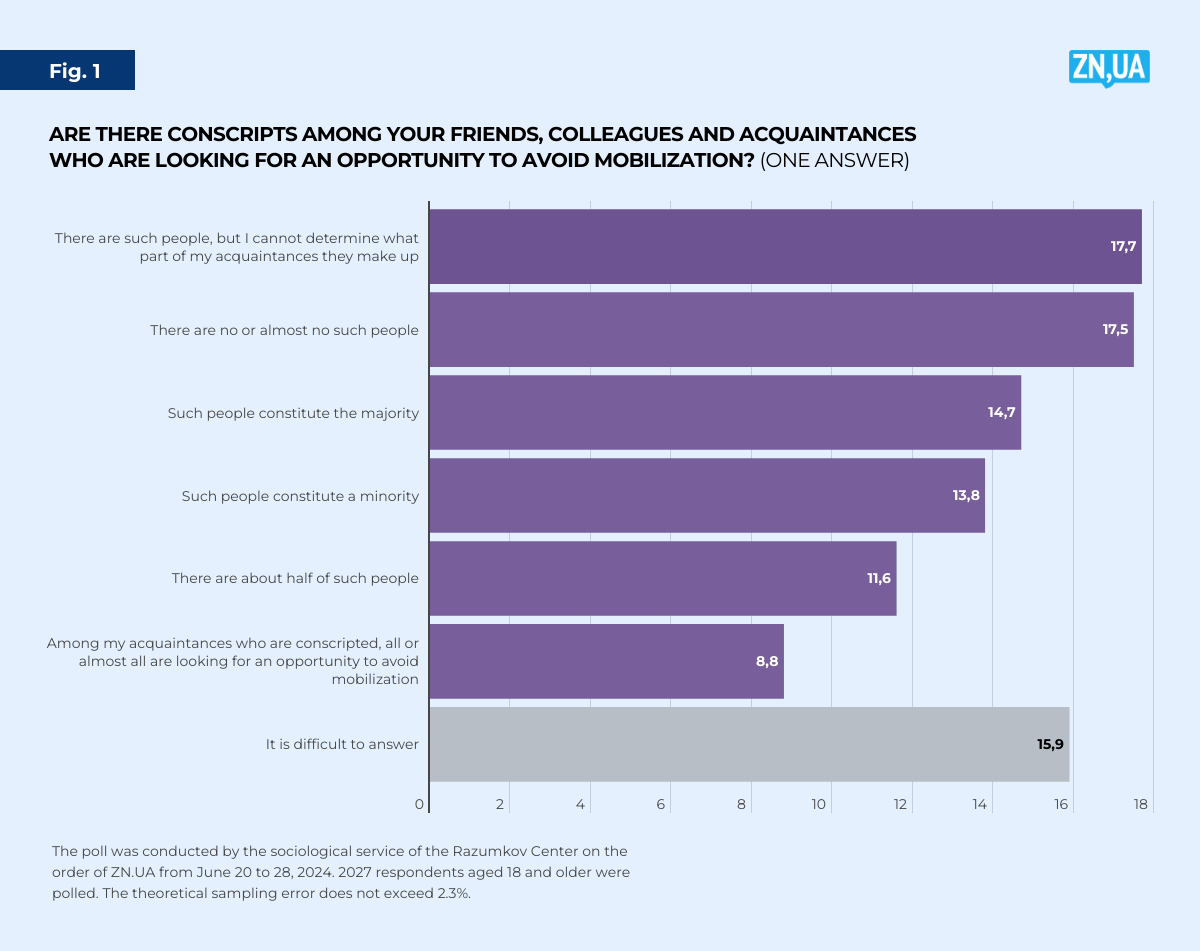
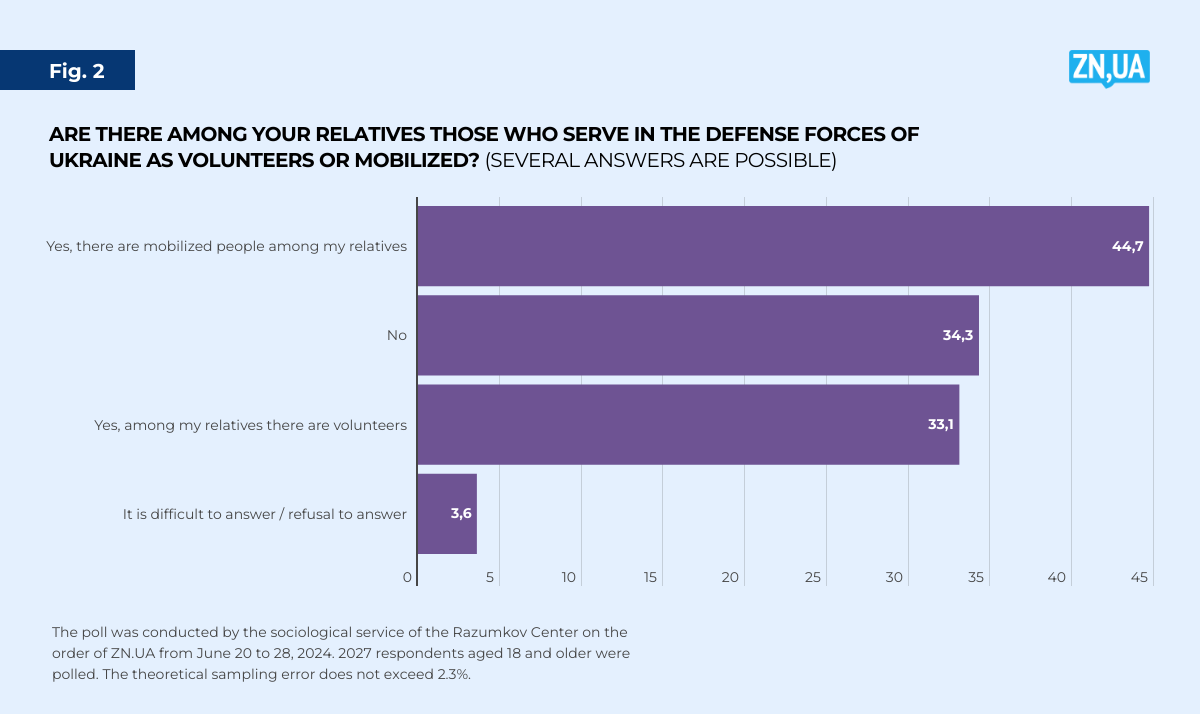
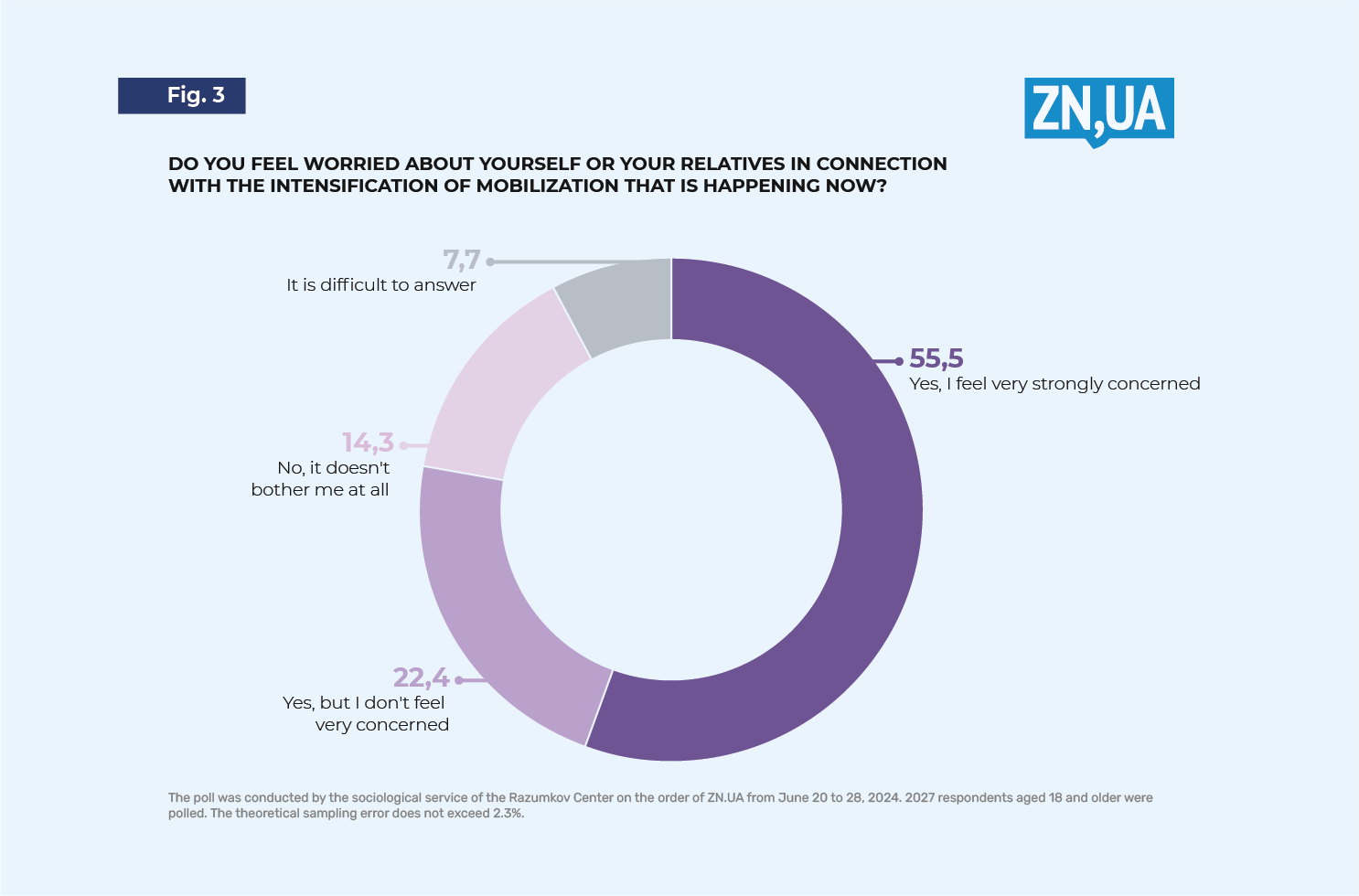
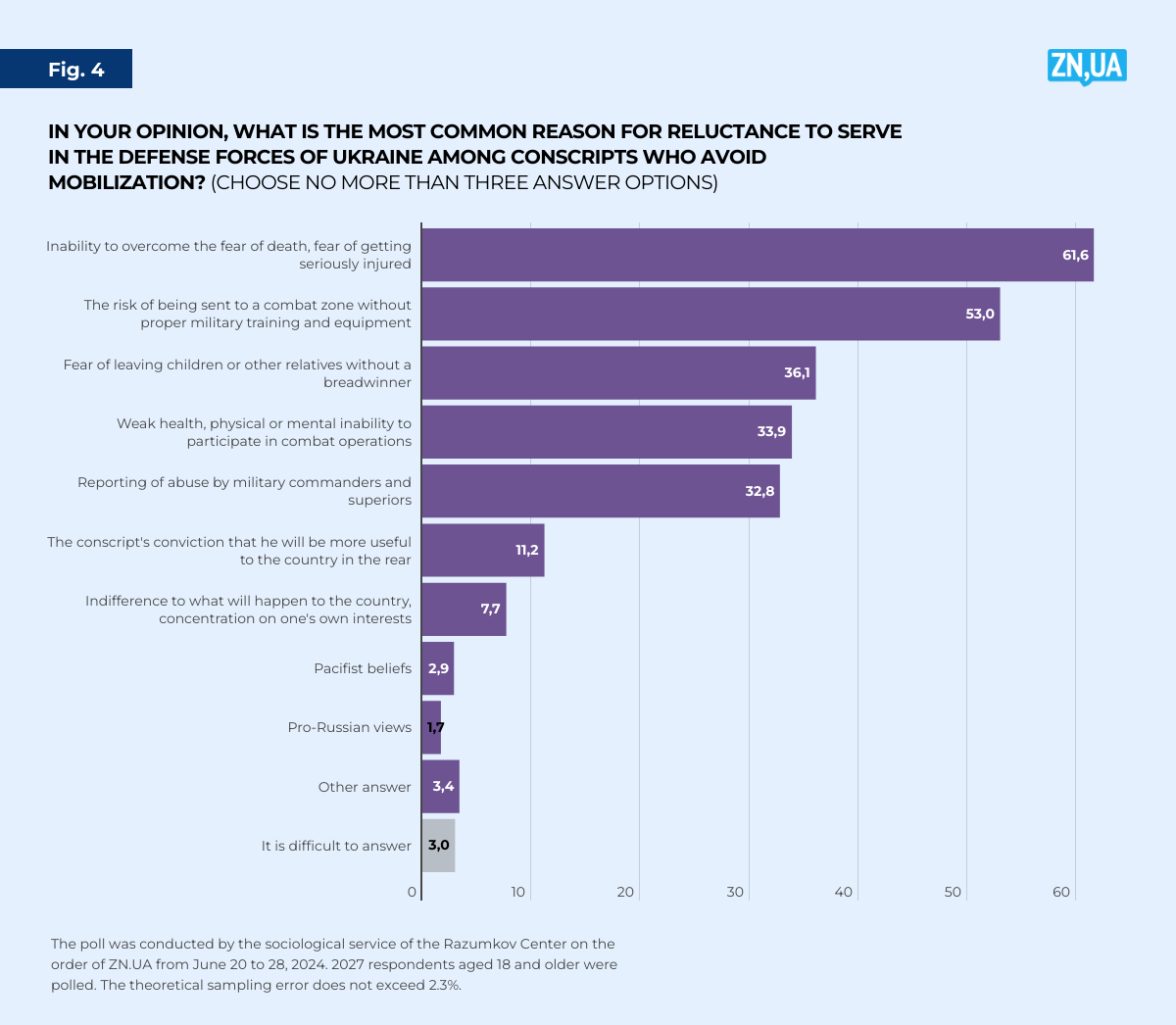
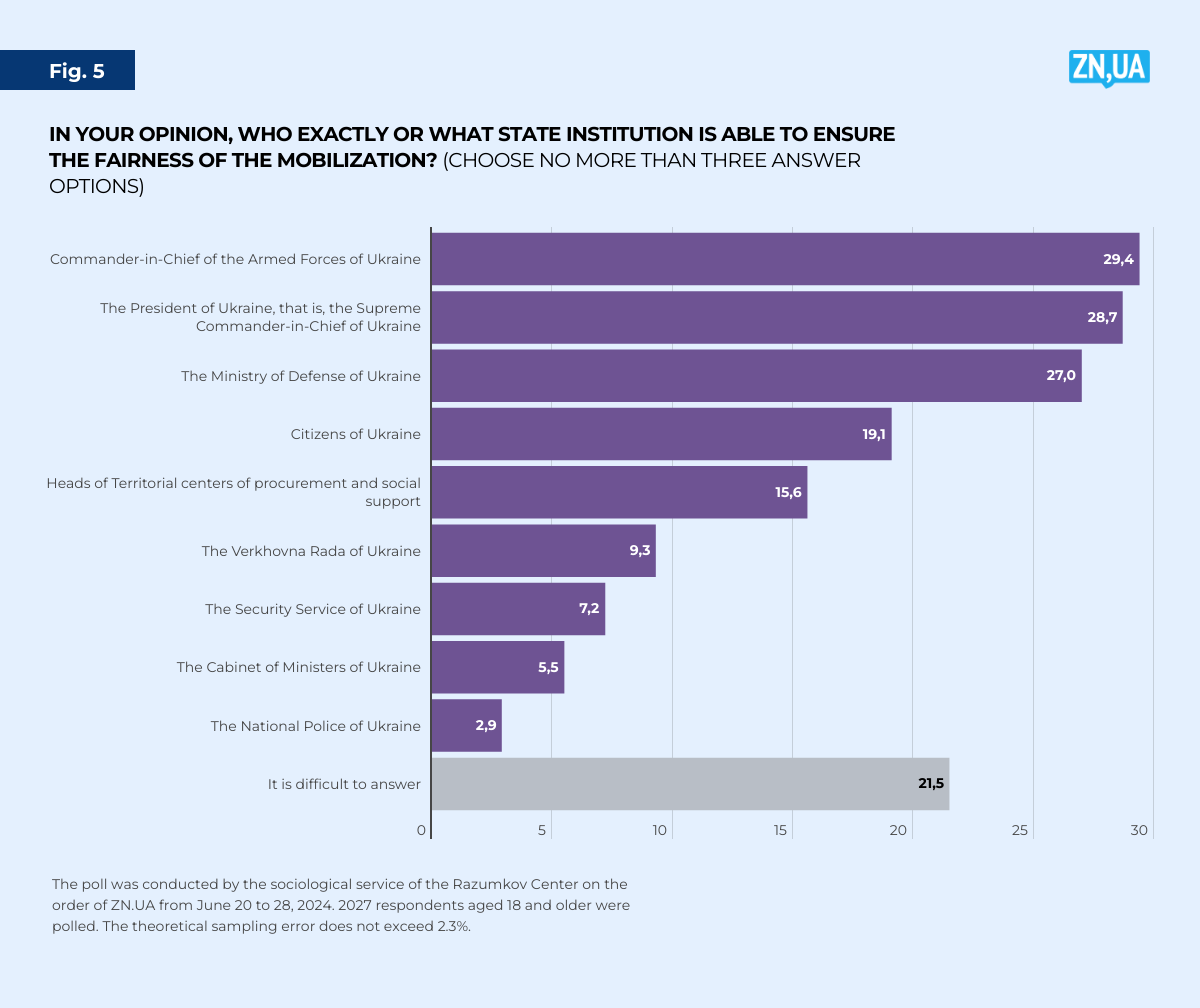
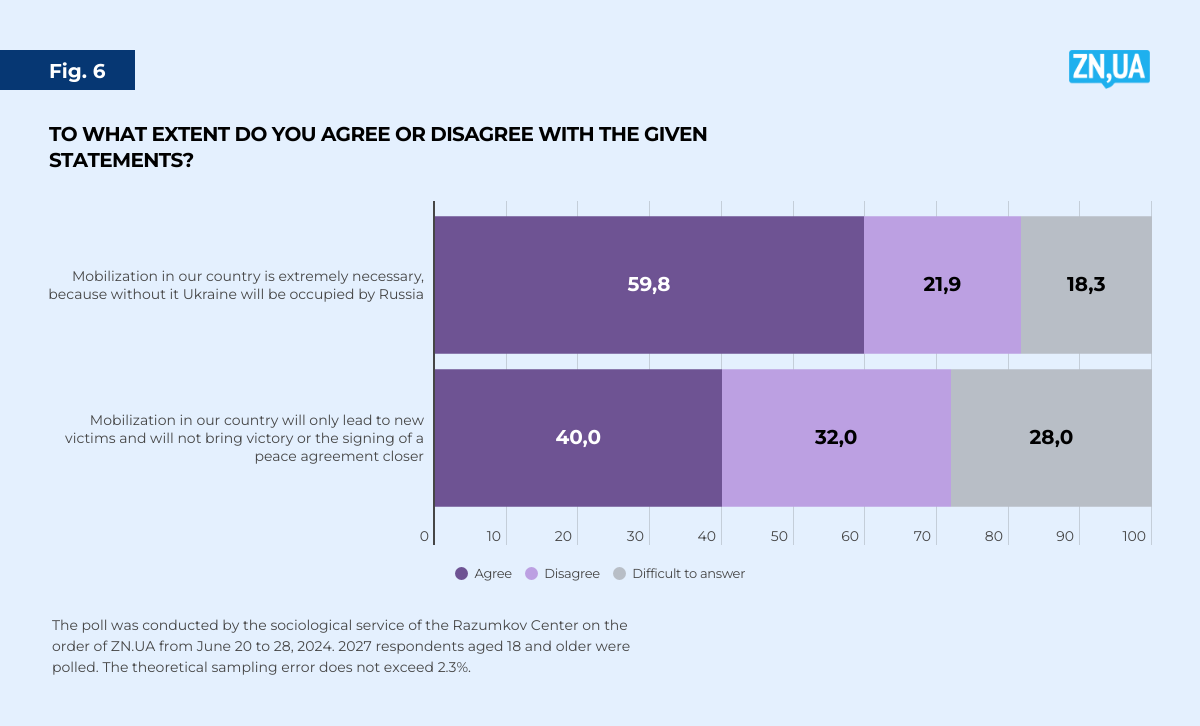
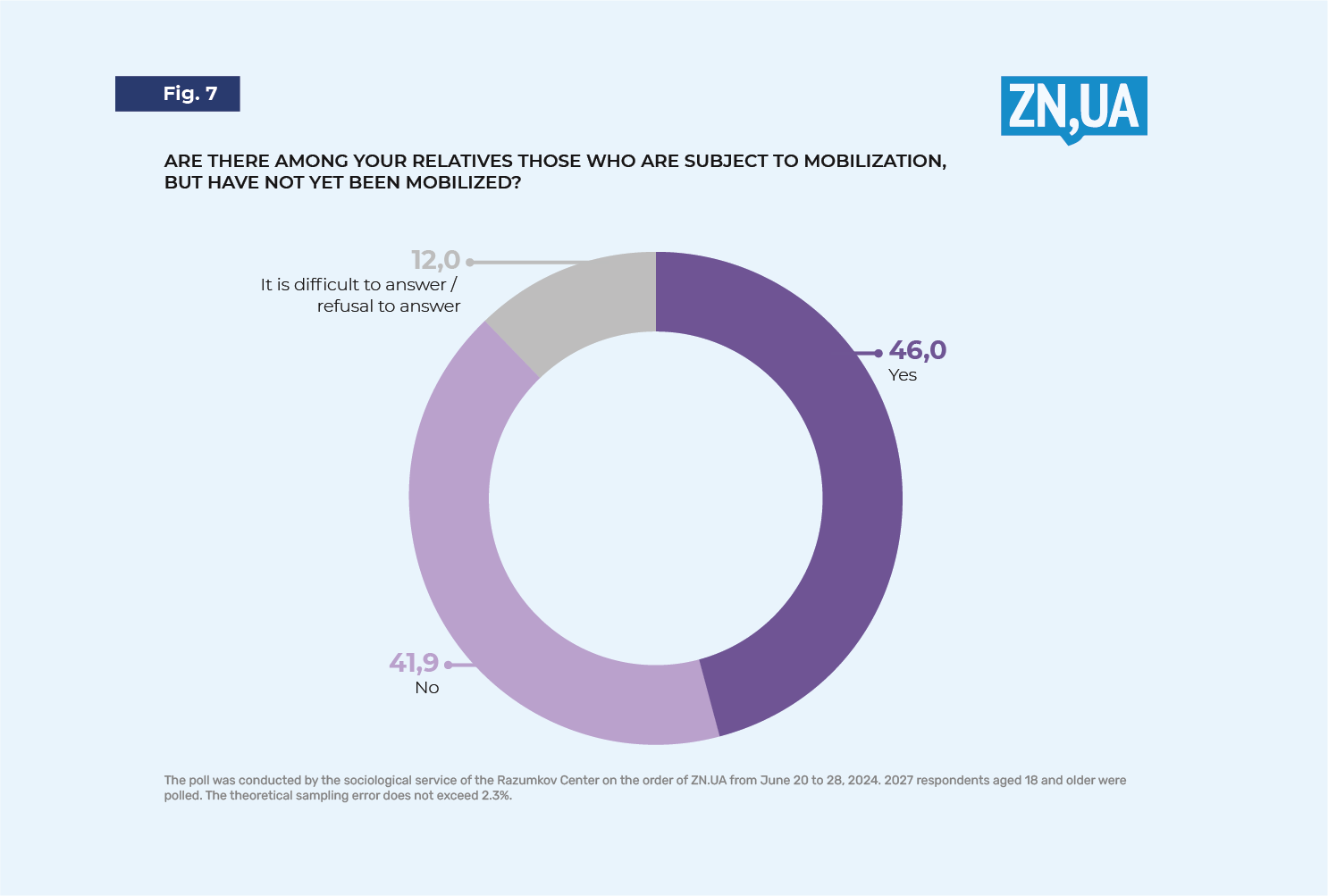
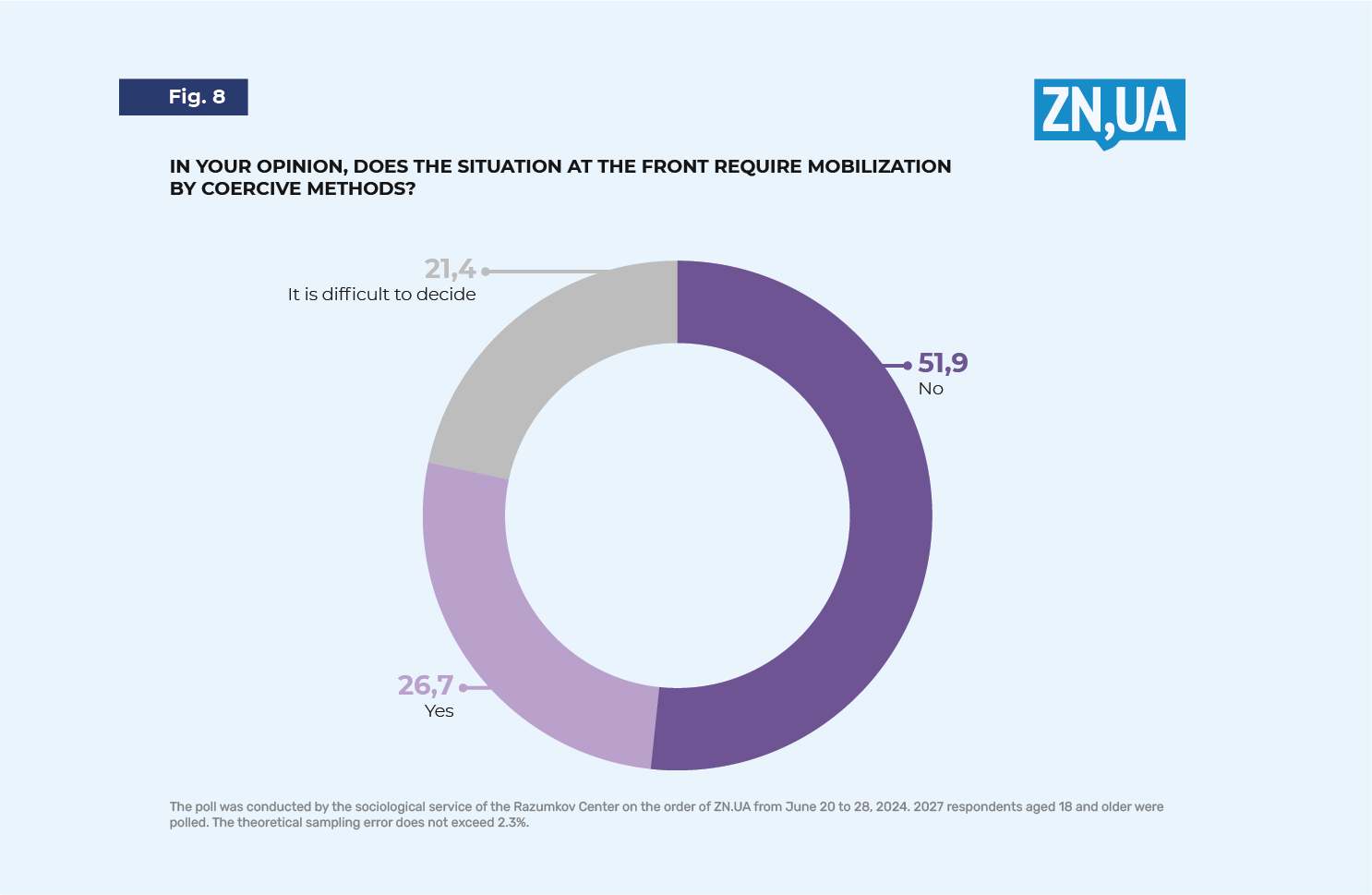
 Login with Google
Login with Google